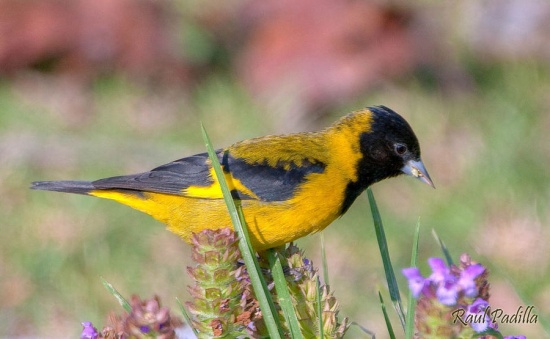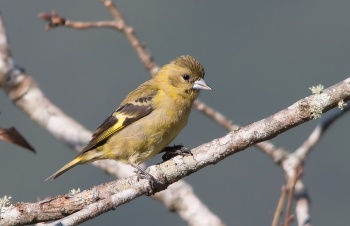Sbarnhardt (talk | contribs) (Amend Gsearch for new system, Add Gsearch Checked template) |
|||
| (10 intermediate revisions by 4 users not shown) | |||
| Line 1: | Line 1: | ||
| − | + | [[Image:Black-headed_Siskin_by_Raul_Padilla.jpg|thumb|550px|right|Photo by {{user|Raul_Padilla|Raul Padilla}}<br / >Tutotepec, [[Mexico]], May 2010]] | |
| − | [[Image:Black- | + | ;[[:Category:Spinus|Spinus]] notatus |
| + | ''Carduelis notata'' | ||
==Identification== | ==Identification== | ||
| − | + | [[Image:Carduelis notata Black-headed SIskin .jpg|thumb|350px|right|Juvenile<br />Photo by {{user|Raul+Padilla|Raul Padilla}}<br />La Mision, [[Mexico]], December 2014]] | |
| + | 10–12 cm (4-4¾ in)<br /> | ||
| + | '''Male''' | ||
| + | *Black head and chest | ||
| + | *Black shoulders | ||
| + | *Golden yellow upperparts and underparts | ||
| + | *Bright yellow wing bars<br / > | ||
| + | '''Female''' - similar to male but lacks the black chest. | ||
| + | ==Distribution== | ||
| + | [[North America|North]] and [[Central America]]<br /> | ||
| + | '''North America''': [[Texas]]<br /> | ||
| + | '''Central America''': [[Mexico]], [[Guatemala]], [[Belize]], [[El Salvador]], [[Honduras]], [[Nicaragua]] | ||
| + | ==Taxonomy== | ||
| + | ====Subspecies==== | ||
| + | There are 3 subspecies<sup>[[#References|[1]]]</sup>: | ||
| + | *''S. n. notata'': | ||
| + | :*Oak-pine forests of eastern [[Mexico]] (San Luis Potosí) to northern [[Guatemala]] | ||
| + | *''S. n. forreri'': | ||
| + | :*Oak-pine belt of western [[Mexico]] (southern Sonora and Chihuahua to Guerrero) | ||
| + | *''S. n. oleacea'': | ||
| + | :*Coniferous forests of [[Belize]] to [[Honduras]] and northern [[Nicaragua]] | ||
| + | |||
| + | Formerly placed in the genus ''[[Carduelis]]''. | ||
| + | ==Habitat== | ||
| + | Lower and submontane forests between 2000-3000m. Agricultural, woodland and gardens. | ||
| + | ==Behaviour== | ||
| + | ====Diet==== | ||
| + | They forage on the ground, cling to plant stems, and in trees searching for a variety of plant and pine seeds. | ||
| + | ====Breeding==== | ||
| + | There is little information available. Their breeding season runs from May to July and they lay 2 eggs. | ||
| + | ==References== | ||
| + | #{{Ref-Clements6thAug16}}#Avibase | ||
| + | #BF Member observations | ||
| + | #Handbook of the Birds of the World Alive (retrieved February 2017) | ||
| + | {{ref}} | ||
==External Links== | ==External Links== | ||
| − | {{GSearch|Carduelis | + | Search the Gallery using the scientific name: |
| − | [[Category:Birds]] | + | {{GSearch|siskin+notat*}} <!--- Comment: mixed search item to ensure that the search finds images with both ''Carduelis'' and ''Spinus'' as genus name ---> |
| + | Search the Gallery Using the common name: | ||
| + | {{GSearch|"Black-headed Siskin"}} | ||
| + | {{GS-checked}} | ||
| + | [[Category:Birds]] [[Category:Spinus]] | ||
Latest revision as of 14:25, 26 March 2022
- Spinus notatus
Carduelis notata
Identification
10–12 cm (4-4¾ in)
Male
- Black head and chest
- Black shoulders
- Golden yellow upperparts and underparts
- Bright yellow wing bars
Female - similar to male but lacks the black chest.
Distribution
North and Central America
North America: Texas
Central America: Mexico, Guatemala, Belize, El Salvador, Honduras, Nicaragua
Taxonomy
Subspecies
There are 3 subspecies[1]:
- S. n. notata:
- S. n. forreri:
- Oak-pine belt of western Mexico (southern Sonora and Chihuahua to Guerrero)
- S. n. oleacea:
Formerly placed in the genus Carduelis.
Habitat
Lower and submontane forests between 2000-3000m. Agricultural, woodland and gardens.
Behaviour
Diet
They forage on the ground, cling to plant stems, and in trees searching for a variety of plant and pine seeds.
Breeding
There is little information available. Their breeding season runs from May to July and they lay 2 eggs.
References
- Clements, J. F., T. S. Schulenberg, M. J. Iliff, D. Roberson, T. A. Fredericks, B. L. Sullivan, and C. L. Wood. 2016. The eBird/Clements checklist of birds of the world: v2016, with updates to August 2016. Downloaded from http://www.birds.cornell.edu/clementschecklist/download/
- Avibase
- BF Member observations
- Handbook of the Birds of the World Alive (retrieved February 2017)
Recommended Citation
- BirdForum Opus contributors. (2024) Black-headed Siskin. In: BirdForum, the forum for wild birds and birding. Retrieved 11 May 2024 from https://www.birdforum.net/opus/Black-headed_Siskin
External Links
Search the Gallery using the scientific name:
Search the Gallery Using the common name:
GSearch checked for 2020 platform.





